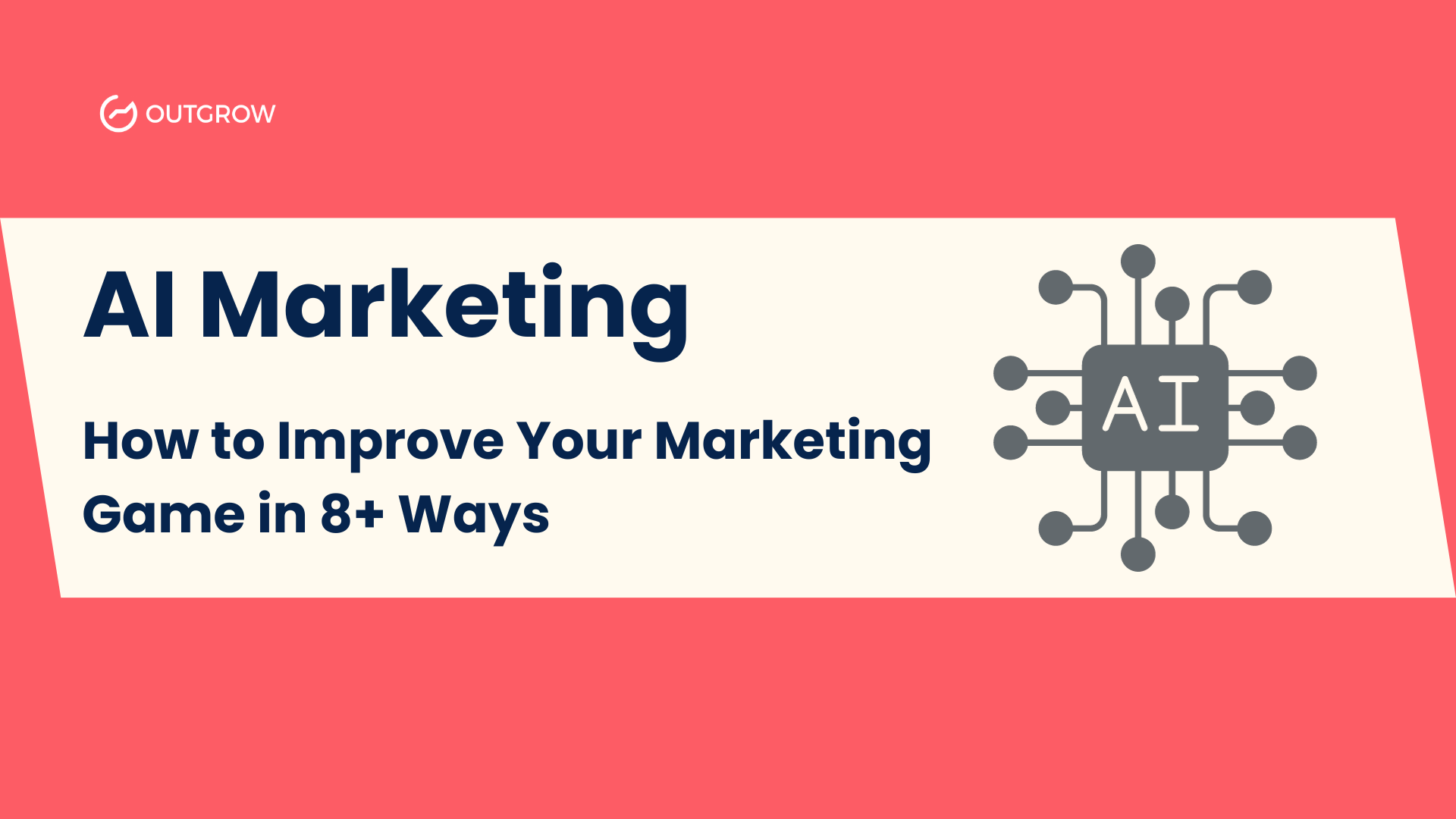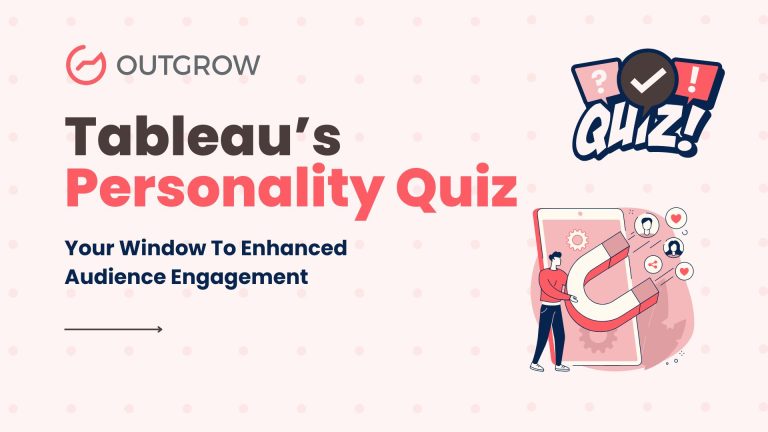AI Marketing: How to Improve Your Marketing Game in 8+ Ways
Table of Contents
In today’s digital age, businesses always seek innovative solutions to gain a competitive edge. AI is no longer just a thing of the future. It is here now and will continue to play an important role in our lives for years to come.
Hence, from the business perspective, there is no better time than now to understand the importance of AI. AI marketing, the process of utilizing AI in the field of marketing, is shaping the landscape of business success.
In this blog, we will explore how AI can be used in marketing, from social media listening and content generation to audience segmentation and personalization. We will also discuss the benefits of using AI for marketing and the best tools you can use to get started with AI marketing.
So, let’s get started with the most important question.
What Is AI Marketing?
AI marketing is the use of artificial intelligence (AI) to automate and improve marketing tasks. It is used to collect and analyze data, identify patterns and trends, and make predictions. This information can then be used to create more targeted and effective marketing campaigns.
How Can AI Be Used in Marketing?
AI marketing is a broad field, and there are many different ways to use AI for marketing purposes. Let’s take a look at some of the best techniques.
1. Content Generation
AI-generated content, such as blog posts, social media posts, and email newsletters can be prepared in a variety of ways, such as:
AI-powered Writing Tools:
AI-powered writing tools can help marketers write more engaging and informative content. These tools can generate content ideas, write headlines, and optimize content for search engines.
Copy.ai is one such tool that can assist in generating engaging and SEO-optimized content. It provides content ideas, writes headlines, and helps optimize content for search engines. However, when using such tools, it’s important to run the generated content through an AI detector in order to confirm its originality.
AI-powered Image Generation Tools:
AI-powered image generator tools can help marketers create high-quality images without having to hire a designer. These tools can generate images from text descriptions, or they can edit existing images.
Artbreeder is a creative platform that uses AI to generate high-quality images from text descriptions. It’s excellent for creating visual content without the need for a designer. Colorcinch lets you change or remove image and photo backgrounds with the power of AI.
AI-powered Video Generation Tools:
AI-powered video generation tools can help marketers create engaging videos without having to hire a videographer. These tools can generate videos from text descriptions, or they can edit existing videos.
Lumen5 is a perfect tool for marketers looking to create videos without extensive videography skills. It leverages AI to transform text content into engaging video presentations.
2. Social Media Listening
Marketers can leverage AI to monitor social media for mentions of a brand or product. This information can then be used to track customer sentiment, identify trends, and engage with customers.
For example, a brand can use AI to monitor social media for negative comments about its products. It can then reach out to those customers to resolve the issue.
All of this can be done by AI-powered social media monitoring tools available, such as Brand24, Mention, and Hootsuite. These tools can help you to track mentions of your brand or product, as well as analyze the customer sentiment behind the action across a variety of social media platforms, including Twitter, Facebook, Instagram, and LinkedIn.
3. Automation
Many repetitive and time-consuming marketing tasks can be automated with the help of AI. Some of these are:
Email Marketing:
AI can be used to automate email marketing campaigns, such as sending out welcome emails to new subscribers and abandoned cart emails to customers who have left items in their shopping carts. Email marketing tools such as Klaviyo, can be used to perform these tasks effectively.
Social Media Marketing:
AI can automate social media marketing tasks, such as scheduling posts and responding to comments. A number of social media management tools like Buffer and ContentStudio are available out there, specially designed to perform these tasks and more.
Ad Management:
AI can easily automate ad management tasks, such as creating and targeting ads and tracking ad performance. Tools like GumGum alongside advanced techniques such as Marketing Mix Modelling (MMM) can be used to optimize your ads and improve the performance of your ad campaigns.
4. Audience Segmentation
You can leverage AI to segment customers into different groups based on their demographics, interests, and behavior. This information can then be used to create more targeted and effective marketing campaigns.
For example, an e-commerce company might segment its customers into different groups based on their purchase history. It could then send each group different marketing messages based on their interests.
Optimizely is one such tool that can help you in your audience segmentation. It conducts A/B tests and personalization experiments to create different segments of audiences.
5. Personalization
Personalization of marketing messages and recommendations based on individual customer data can be done in a variety of ways, such as:
Predictive analytics:
Customer data can be analyzed to predict their future needs and interests, which can then be used to send them targeted marketing messages and recommendations. For example, Netflix uses predictive analytics to recommend movies and TV shows to its users based on their past viewing history.
Behavioral targeting:
Customer behavior can be tracked online and targeted with ads based on their interests. For example, Google Ads uses behavioral targeting to target ads to people who have searched for keywords related to the product or service being advertised.
6. Data Analytics
AI can now help you collect and analyze data from a variety of sources, such as website analytics, social media data, and customer surveys. This, in turn, improves marketing campaigns, identifies new opportunities, and helps make better business decisions.
There are many data analytics tools available in the market that can help you automate your data collection process and help your business with data analysis as well.
For example, a company can now analyze its competitor’s website data within minutes to understand the type of audience segment that is connecting with them. It could then try to replicate and target that audience effectively.
MonkeyLearn is a no-code platform with AI data analysis features that allow users to visualize and reorganize their data. It offers a variety of AI-powered text analysis tools that can instantly analyze and visualize data to meet the user’s needs.
7. Customer Support
AI-powered chatbots form the backbone of AI customer support, allowing businesses to answer questions instantly, resolve issues efficiently, and generate leads—all without compromising on quality. Chatbots can be used on websites, social media platforms, and messaging apps.
For example, a company might use a chatbot to instantly guide customers through the product selection process, provide real-time information on product availability, and ensure seamless online purchases. This not only enhances customer satisfaction but also boosts sales and conversion rates.
OpenAI’s ChatGPT is undoubtedly, the most popular AI chatbot at the moment. Take a look below at the answer it provided when I asked, “Which is the best AI chatbot in the market?”
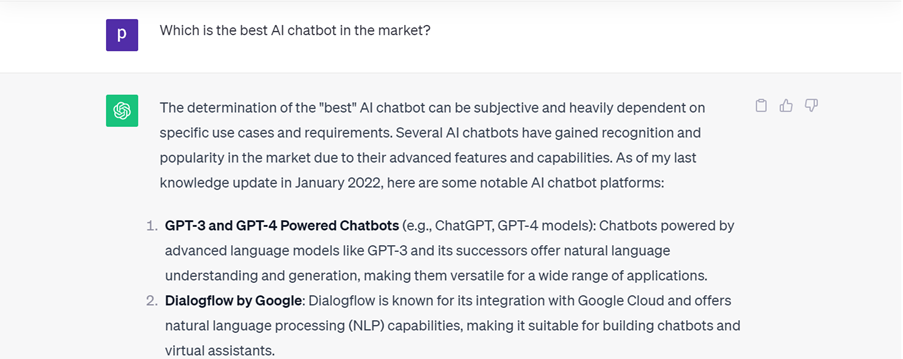
8. Ad Generation
Ads can be generated based on a variety of factors, such as target audience, budget, and campaign goals. This can help marketers create more effective and targeted ad campaigns.
For example, Google Ads generates ads for businesses based on their budget and campaign goals. It uses its machine learning algorithms to analyze the customer segments selected and suggests the daily ad budget accordingly.
Tools like Simplified’s AI ad generator feature enables the user to generate the most appropriate ad creative based on the inputs provided. It will prompt the user to enter brand assets, such as logo, colors, and fonts. Then, the user will choose their target audience and the platform for the ads. The AI then analyzes the target audience’s pain points and selects the best tone and length for the platform. And, that’s all!
What Are the Benefits of Using AI in Marketing?
AI offers many benefits for businesses that are looking to improve their marketing efforts. These include:
Improved Customer Targeting
Marketers can identify and target their ideal customers with more precision by analyzing customer data, such as demographics, interests, and behavior. They can also track customer behavior online and target them with ads based on their interests. By targeting the right customers with the right messages, businesses can improve their marketing ROI. Plus, they can AI can help analyze already collected data in documents by using an AI chatpdf you can summarize the main points from papers and focus on what is important.
Reduce Cost/Increase Efficiency
AI can make many marketing tasks easier and faster by automating repetitive and time-consuming tasks like email marketing, social media marketing, and ad management. This frees up marketers to focus on more strategic initiatives, like developing new marketing campaigns and building relationships with customers. AI can also help businesses save money on marketing campaigns by automating tasks and optimizing campaigns.
Improved Customer Experience
AI can be used to improve the customer experience in several ways. AI-powered chatbots can provide customer service and support 24/7. AI can also provide personalized marketing messages and recommendations based on individual customer data. By providing a better customer experience, businesses can increase customer satisfaction and loyalty.
Scalability of Marketing Campaigns
Businesses can easily scale up or down AI marketing campaigns based on their needs. This makes AI marketing a good option for businesses of all sizes.
Fraud Detection
AI fraud detection software can detect fraud in marketing campaigns. For example, it can identify fake accounts and fraudulent clicks. By detecting and preventing identity fraud, businesses can protect their marketing budgets and improve the results of their campaigns.
Similarly, fintech businesses exploring custom fintech solutions with similar AI features can enhance fraud prevention and strengthen customer trust.
Trends Prediction
AI can be used to analyze data and identify the latest content marketing trends. This information can then be used to develop more effective marketing campaigns. For example, a company might use AI to analyze sales data to identify trends in customer behavior. It could then use this information to develop marketing campaigns that are more likely to appeal to its customers.
How Top Brands Are Using AI for Success
From personalized customer experiences to data-driven decision-making, AI is transforming the way businesses connect with their audience. Discover how top companies are leveraging AI to enhance their marketing strategies, and streamline operations, and growth.
Here are some specific examples of how brands are using AI for marketing:
1. Netflix
Have you ever noticed how the Movie/TV show suggestions that are presented by Netflix are always on point? Ever wondered how that happened? That is all AI.
They leverage AI to learn about your viewing habits so that it can create a custom viewing experience for you.
In addition to tailoring content suggestions, Netflix now employs AI for other groundbreaking purposes. For instance, they utilize AI to optimize the streaming quality for users, reducing buffering and providing a smoother viewing experience.
This ensures that your binge-watching sessions are uninterrupted by technical glitches, making AI an integral part of the behind-the-scenes magic at Netflix.
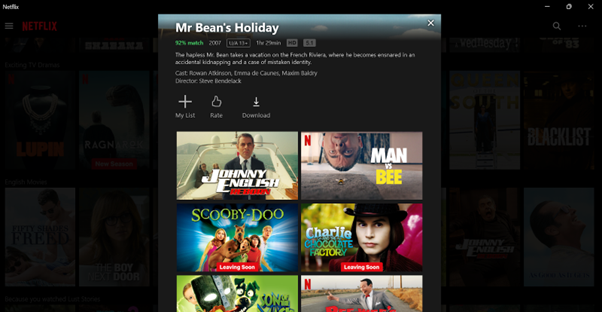
2. Amazon
Amazon’s AI not only suggests products based on past purchases but also leverages data from what other customers have bought in the same area, browsing and search history, and many other factors.
They also use AI to increase and decrease the price according to market demand. This way, they ensure they are always one step ahead of the market.
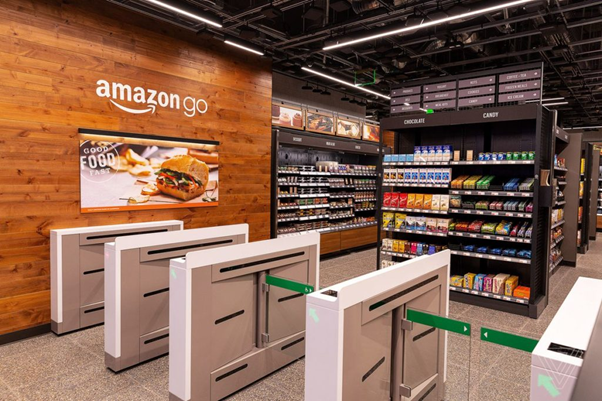
Moreover, they have recently opened stores in the USA where people can pick up the items they want and go out of the store. The AI will scan the products via cameras and charge them accordingly via Amazon Go without the need for customers to line up. This is a revolution for in-store shopping.
3. Coca-Cola
Coca-Cola, the world’s largest non-alcoholic beverage company, is the latest to jump on the AI bandwagon. While many brands rely on using already available AI tools, Coca-Cola’s AI tool is their own!
Coca-Cola, OpenAI, and Bain & Company worked together to create a platform called “Create Real Magic”. This platform combines two powerful AI systems: GPT-4 and DALL-E. GPT-4 can generate realistic text from search queries, while DALL-E can create images from text descriptions.
Coca-Cola engaged its audience by encouraging them to create digital artwork inspired by its brand elements, such as the contour bottle and script logo. Artists could download and submit their creations, with the most impressive ones displayed on digital billboards in locations like New York’s Times Square.

They recently ran ads created from scratch by AI and got a pretty amazing response for it. They also use AI in their vending machines. Customer purchase data was fed into their AI algorithm and then they followed the recommendations presented by it.
Coca-Cola was able to determine the number of bottles to be restocked at which location and at what intervals by understanding the customer behaviour. This resulted in increased profits and saved the company many human hours.
4. Heinz
Heinz recently collaborated with Rethink Ideas, a marketing agency, to create the world’s first marketing campaign featuring visuals created entirely by AI.
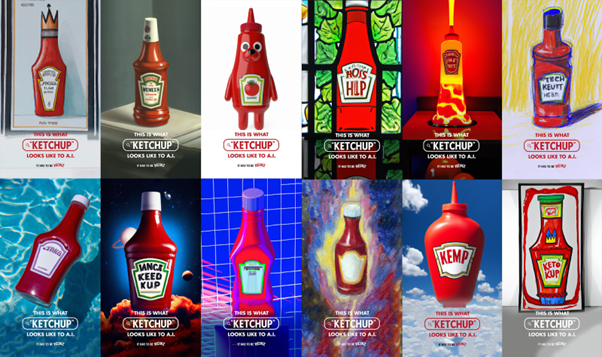
The agency then encouraged consumers to submit their own AI prompts for ketchup-based imagery, and the best creations were featured in social media posts and print ads.
5. Nutella
Nutella wanted to create unique and desirable packaging that would make their brand more talkable. Ogilvy Italia, a branding agency, took on this challenge and used AI and a dozen patterns to create 7 million one-of-a-kind labels with each being unique. This resulted in the birth of Nutella Unica.
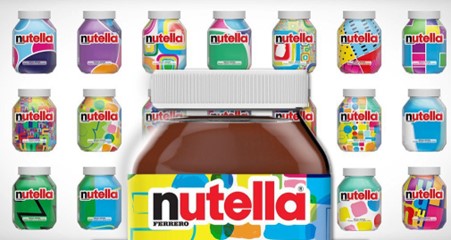
The 7 million jars produced for this campaign sold out as soon as they hit the market.
Best AI Marketing Tools
There are a lot of AI marketing tools in the market right now. But these are the creme de la creme – the ones that can help every marketer out there.
For the complete list, check out this comprehensive blog on AI tools.
1. Jasper AI
2. Copy.ai
3. Frase AI
4. Writesonic
5. Canva
6. Adobe Firefly
7. MidJourney
Wait, there’s one tool that needs a special mention here. Let’s get right to it!
How Can Outgrow Help In AI Marketing?
Outgrow is a powerful tool that lets its users create interactive content. You are spoilt for choice with the no-code functionality for interactive content like surveys, polls, quizzes, calculators, and much more.
Outgrow empowers marketers with AI-driven interactive content that not only captures leads but also provides valuable insights and personalization options. With Outgrow’s AI content generator, you can create interactive content with just a few clicks. Just put in a few details about your industry, product, features, etc, and viola! It’s that easy.
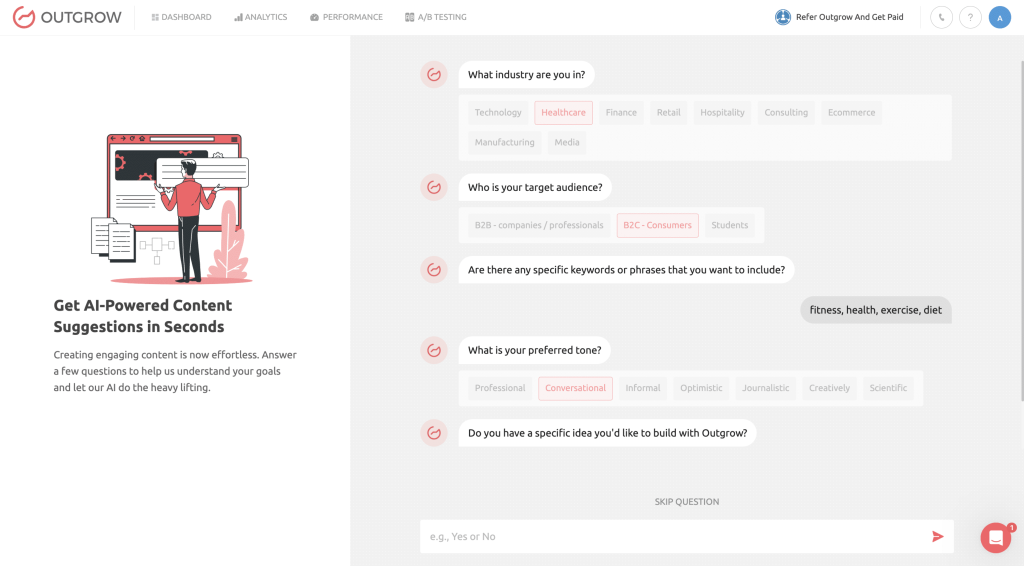
Conclusion
AI marketing is a powerful tool that enables businesses to reach their target audience more effectively. You can leverage it to personalize your approach and optimize the marketing campaigns for better results. It is worth mentioning that the ethical use of AI is also very important as users’ privacy is at stake.
One of the most effective ways to provide value to users in exchange for their information is through interactive content. Here’s where Outgrow’s AI capabilities come in handy. Outgrow simplifies the process of creating interactive content, all without the need for coding or technical expertise.
By using Outgrow, you can create content that resonates with your audience, captures leads, and garners valuable insights. It’s a powerful way to engage your target audience effectively, delivering personalized experiences that lead to higher engagement and conversions.
And the best part is, there is a free 7-day trial and no credit card info is required! So, what are you waiting for, start creating your first piece of Interactive content today!

